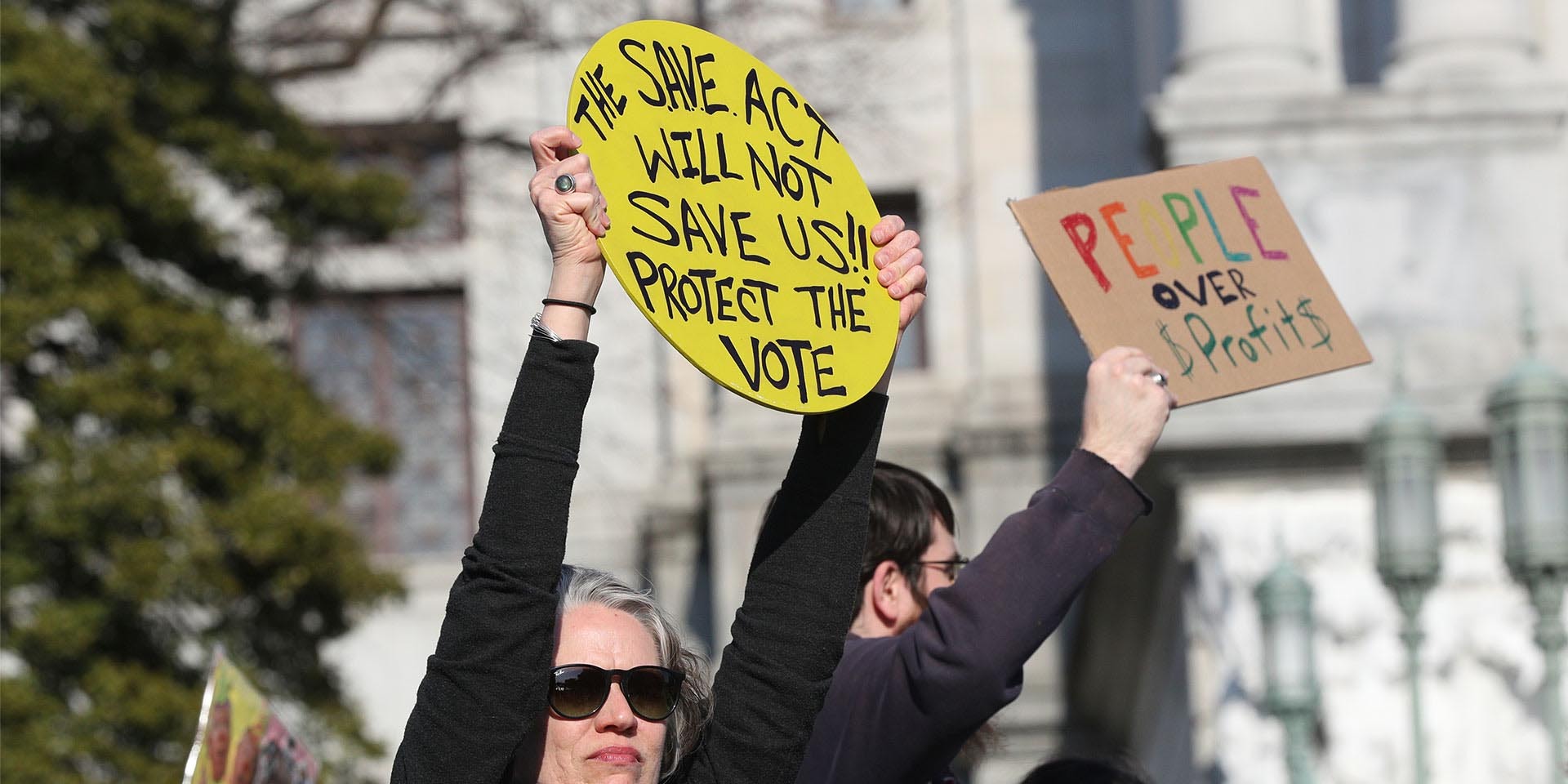The Safeguard American Voter Eligibility Act, or SAVE Act, is dangerous and deceptive legislation in Congress that would make it harder for millions of eligible people to register and vote, year after year.
The SAVE Act requires most voters to show a passport or birth certificate to register
The bill:
- Requires every single voter to provide documentary proof of citizenship (DPOC), in person at an election office, each time they want to register to vote or update their registration.
- For most Americans, this would mean showing a passport, a birth certificate, or naturalization papers.[1]
- Creates civil and criminal penalties — including up to five years in prison — for election workers who register a voter who doesn’t present DPOC, even if that voter is a citizen.
- Would upend voter registration as we know it. Requiring voters to present DPOC in person at election offices would nullify common methods of voter registration:
- Mail-in registration
- Online voter registration
- Voter registration drives
The SAVE Act would make it harder for millions of people to register and vote
An estimated 21.3 million Americans do not have easy access to the forms of DPOC this bill requires. The SAVE Act would be especially burdensome for:
Married women and others who have changed their names and do not have a birth certificate that matches their current legal name.
Lower-income people and people with lower levels of education, who are less likely to have a passport.
Rural people who live far from elections offices.
People with disabilities and elderly people, who have a harder time showing up in person and rely on online or mail-in registration.
Eligible voters who are incarcerated, hospitalized, or otherwise unable to present themselves in person.
Voters of color, who fall into all these categories, but additionally whose communities also have a long, rich tradition of building civic engagement through voter registration drives, which would become impossible under this bill.
The bill’s in-person DPOC requirement would effectively change the way millions of voters get registered. Voters who previously registered via mail, online, or a voter registration drive at a school, church, or community institution would now have to travel to an election office, sometimes at great distance from their homes, to present the DPOC in person every time they need to register or update a registration. One recent analysis found that one-third of registrations ahead of the 2020 and 2022 elections took place via mail, online, or through a voter registration drive — that’s millions and millions of people who would have to find a new way to register.
The SAVE Act would upend decades of voter registration modernization
In addition to convenience, these modernizations have made our voting rolls more accurate. By allowing people to update their registration when they move, change their name, or otherwise make a change to their voting status, these forms of registration nullified by the bill have for years helped ensure the registration rolls are up to date and don’t include ineligible people. Thanks to voter registration modernizations and other list maintenance tools regularly employed by election officials, instances of ineligible people voting — noncitizens, for example — are “vanishingly rare.”
In fact, there are strong protections against noncitizen voting, which is illegal in all state and federal elections. Any noncitizen who attempts to register and/or vote already faces fines, prison time, prevention from ever becoming a citizen, and deportation. Rather than protecting our elections, the SAVE Act is an attempt to trick us into making it harder for millions of eligible Americans to cast their votes.
DPOC requirements at the state level have disenfranchised thousands of voters
A decade ago, Kansas passed a DPOC law that went on to block 31,000 eligible citizens from registering — or 12% of new registrants in Kansas. The law was ultimately struck down in court for burdening voters, in violation of the Constitution. When asked recently about Congress’ consideration of a DPOC requirement, Kansas’ secretary of state, a Republican, replied that “Kansas did that 10 years ago. It didn’t work out so well.”
A similar DPOC law New Hampshire passed last year is already preventing people from voting and making voting much more cumbersome and costly for others. During the first elections for which the DPOC requirement was in effect, a local voting rights group monitoring just two dozen polling places found nearly 100 eligible voters were turned away, a number that is almost certainly higher across the state. And some who were eventually able to vote had to return to the polling place three times with additional documents to prove their citizenship.
There’s time to stop the SAVE Act now — here’s what you can do
1
Contact your representative and senators and tell them to vote NO on this harmful bill.
2
Show up at your Congress members’ town halls, or go to their district offices, and ask them whether they support the SAVE Act.
3
Spread the word about this harmful bill and encourage your friends and family to contact their members of Congress, too.
Image at top: (Credit: Sipa USA / AP Images)
[1] For most Americans, a state-issued driver’s license — including REAL ID — would not satisfy the requirements of the SAVE Act, as the vast majority of these IDs do not indicate citizenship status.


